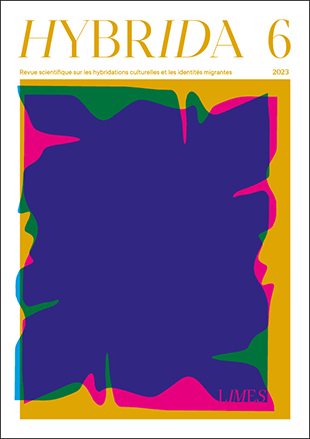Análisis fanoniano del racismo y de las estructuras postcoloniales de la alteridad
DOI:
https://doi.org/10.7203/HYBRIDA.6.26240Palabras clave:
racismo, violencia estructural, límites simbólicos Resumen
Resumen
El documento explora cómo afectan las fronteras a la búsqueda de identidad en el contexto del racismo y el colonialismo. Los individuos colonizados experimentan a menudo un sentimiento de alienación e inferioridad causado por las limitaciones impuestas por las estructuras de poder coloniales, lo que les lleva a buscar una identidad personal. Sin embargo, la división binaria entre colonizador y colonizado afecta a todos los implicados, lo que hace más compleja la búsqueda de la identidad personal y refuerza el racismo sistémico. La primera sección del artículo examina cómo la raza, un concepto socialmente construido, desempeña un papel crucial en la definición de la diferencia entre uno mismo y los demás, imponiendo estructuras de alteridad basadas en el análisis Fanonian. La segunda sección analiza si es posible evitar o superar el racismo y la opresión racial, arrojando luz sobre la naturaleza inherente de la alteridad, el racismo y la violencia latente.
 Descargas
Descargas
 Citas
Citas
Ahmed, S. (2012). On Being Included. Racism and Diversity in Institutional Life. Duke University Press.
Atenasio, D. (2019). Blameless Participation in Structural Injustice. Social Theory and Practice, 45(2), 149–177. https://www.jstor.org/stable/45219127
Bhabha, H. K. (2004). The Location of Culture. Routledge Classics.
Bonilla-Silva, E. (1997). Rethinking Racism: Toward a Structural Interpretation. American Sociological Review, 62(3), 465–480. https://doi.org/10.2307/2657316
Butler, J. (2020). The Force of Nonviolence. Verso.
Christian, M. (2019). A Global Critical Race and Racism Framework: Racial Entanglements and Deep and Malleable Whiteness. Sociology of Race and Ethnicity, 5(2), 169–185. https://doi.org/10.1177/2332649218783220
Essed, P. (1991). Understanding Everyday Racism: An Interdisciplinary Theory. Sage Publications.
Elias, A. (2023). Racim as Neglect and Denial. Ethnic and Racial Studies, 1–23. https://doi.org/10.1080/01419870.2023.2181668
Fanon, F. (2008). Black Skin, White Masks. (R. Philcox, Trans.). Grove Press.
Fanon, F. (2021). The Wretched of the Earth. (R. Philcox, Trans.). Grove Press.
Foucault, M. (1995). Discipline and Punish. The Birth of the Prison. Vintage Books.
Foucault, M. (2008). The Birth of Biopolitics: Lectures at the Collège de France, 1978-1979. M. Senellart, F. Ewald & A. Fontana (Ed.). Palgrave Macmillan (Translation G. Burchell). https://doi.org/10.1057/9780230594180
Garcia, J. A. (2017). The Race Project: Researching Race in the Social Sciences Researchers, Measures, and Scope of Studies. Journal of Race, Ethnicity, and Politics, 2(2), 300–346. https://doi.org/10.1017/rep.2017.15
Glasgow, J. (2009). Racism as Disrespect. Ethics, 120(1), 64–93. https://doi.org/10.1086/648588
Glissant, É. (1997). Poetics of Relation. (Translated by B. Wing) University of Michigan Press. https://doi.org/10.3998/mpub.10257
Gilroy, P. (1999). The Black Atlantic. Modernity and Double Consciousness. Verso.
Golash-Boza, T. (2016). A Critical and Comprehensive Sociological Theory of Race and Racism. Sociology of Race and Ethnicity, 2(2), 129–141. https://doi.org/10.1177/2332649216632242
Grosfoguel, R. (2016). What is Racism? Journal of World-Systems Research, 22(1), 9–15. https://doi.org/10.5195/jwsr.2016.609
Knoblauch, S. H. (2020) Fanon’s Vision of Embodied Racism for Psychoanalytic Theory and Practice. Psychoanalytic Dialogues, 30(3), 299–316. https://doi.org/10.1080/10481885.2020.1744966
Levi-Strauss, C. (1952). Race and History. UNESCO.
Marriott, D. (2018). Whither Fanon? Studies in the Blackness of Being. Stanford University Press.
Mbembe, A. (2019). Necropolitics. Duke University Press.
Mbembe, A. (2001). On the Postcolony. University of California Press.
Nayar, P. K. (2020). Fanon and Biopolitics. In D. J. Byrd & S. Javad. (Eds.), Frantz Fanon and Emancipatory Social Theory. A View from the Wretched (pp. 217–230). Brill.
Nielsen, C. R. (2011). Resistance through Re-narration: Fanon on Deconstructing Racialized Subjectivities. African Identities, 9(4), 363–385. https://doi.org/10.1080/14725843.2011.614410
Oliver, K. (2003). Alienation and Its Double; or, The Secretion of Race. In R. Bernasconi & S. Cook (Eds.), Race and Racism in Continental Philosophy (pp. 176–195). Indiana University Press.
Osanami Törngren, S. & Suyemoto, K. L. (2022). What does it mean to “go beyond race”? Comparative Migration Studies, 10(9). https://doi.org/10.1186/s40878-022-00280-6
Sayyid, S. (2017). Post-Racial Paradoxes: Rethinking European Racism and Anti-Racism. Patterns of Prejudice, 51(1), 9–25. http://dx.doi.org/10.1080/0031322X.2016.1270827
Seikkula, M. (2019). Adapting to Post-Racialism? Definitions of Racism in Non-Governmental Organization Advocacy that Mainstreams Anti-Racism. European Journal of Cultural Studies, 22(1), 95–109. https://doi.org/10.1177/1367549417718209
Stephens, M. (2018). Skin, stain and lamella: Fanon, Lacan, and inter-racializing the gaze. Psychoanalysis, Culture & Society, 23, 310–329. https://doi.org/10.1057/s41282-018-0104-1
Sundstrom, R. & Kim, D. (2014). Xenophobia and Racism. Critical Philosophy of Race, 2(1), 20–45. https://doi.org/10.5325/critphilrace.2.1.0020
Descargas
Publicado
Cómo citar
-
Resumen435
-
HTML 2111
-
PDF 240
Número
Sección
Licencia
![]()
Todos los documentos en la plataforma OJS son de acceso abierto y propiedad de sus respectivxs autorxs.
Lxs autorxs que publican en la revista aceptan los siguientes términos:
- Lxs autorxs conservan los derechos y garantizan a HYBRIDA el derecho a ser la primera publicación del documento, con licencia de Creative Commons de Atribución-NoComercial-CompartirIgual 4.0 Internacional (CC BY-NC-SA 4.0) que permite a otros compartir el trabajo con un reconocimiento de autoría y publicación en la revista.
- Se permite y se anima a lxs autorxs a difundir su trabajo (una vez publicado) a través de medios electrónicos utilizando sitios web personales o institucionales (archivos abiertos institucionales, sitios web personales o perfiles de redes profesionales y académicas).
















